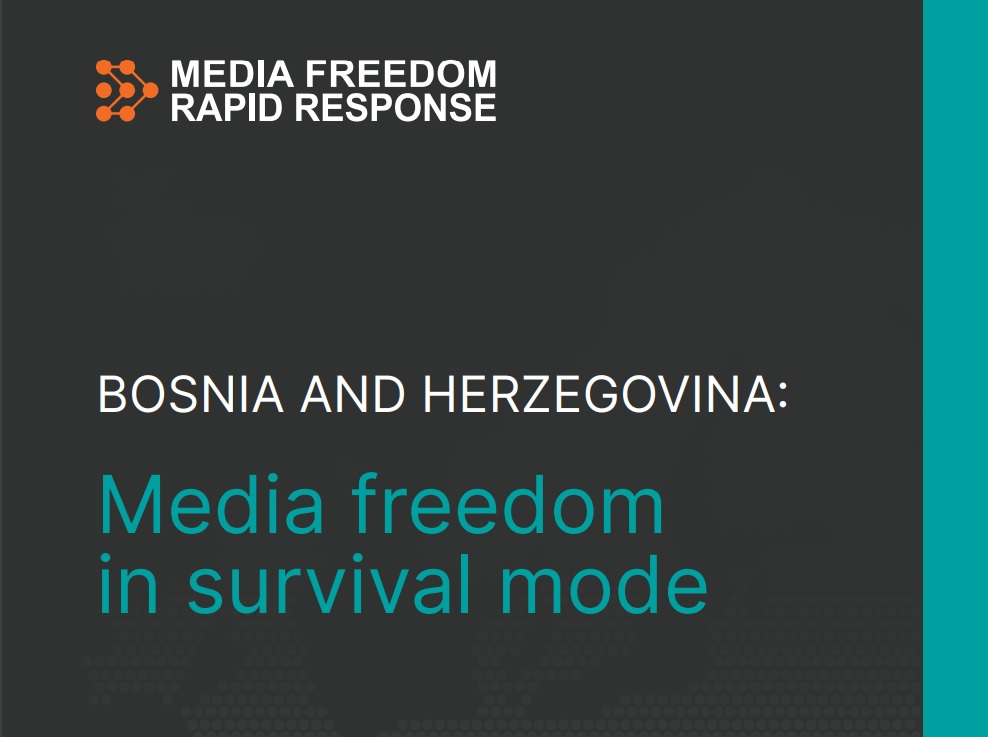The International Press Institute (IPI) today joins its partner organisations in the Media Freedom Rapid Response (MFRR) in launching our joint report on the most serious challenges facing press freedom in Bosnia and Herzegovina following a recent fact-finding mission.
The report – available here – warns that media freedom in the country is in decline against a backdrop of new restrictive laws, hostile rhetoric and denigration of journalists by public officials, and ongoing systemic challenges to the independence of public service media.
The country had long experienced a stagnation in its progress for freedom or media and freedom of expression, amidst the slow fraying of the country’s constitutional framework and increased efforts by the government of one of the state’s two autonomous entities, Republika Srpska, to undermine Bosnian institutions and central governance. However, since the country was granted candidate status for accession to the European Union in 2022, the climate for press freedom has seen an overall decline in the past year.
In its report published in November 2023, the European Commission expressed concerns about the key priority of freedom of expression, freedom of the media, as well as the protection of journalists in Bosnia and Herzegovina. It points out a “backsliding” in media freedom, noting that legislative and political pressure have increased and intimidation and harassment towards journalists continued without appropriate institutional follow-up.
The international press freedom mission to Bosnia and Herzegovina in September 2023 broadly confirmed these observations. Overall, journalists in the country continue to operate in a suffocating environment and poor working conditions. The situation is particularly alarming in Republika Srpska (RS), Bosnia’s Serb entity, where President Milorad Dodik is steadily tightening the screws on independent media, using hostile rhetoric to denigrate journalists and stigmatise critical reporting.
The mission was prompted by the reintroduction of criminal penalties for defamation in August 2023 in Republika Srpska, which caused an outcry among media freedom and journalists’ organisations. More problematic legislation was discussed in Republika Srpska around the same time, including the so-called “foreign agent” law and a media law, although the content of the latter is yet to be revealed.
Meanwhile in the Sarajevo canton, a proposal of a regulation that would allow sanctions for the dissemination of “fake news” is currently pending. The ongoing financial crisis in the country’s public service broadcasters was also closely scrutinised.
These issues were discussed in detail with the MFRR partners and the different stakeholders met during the delegation’s visit to Bosnia and Herzegovina. This report presents the main findings of the mission in three key areas: the legislative initiatives, the safety of journalists, and the public service media. It then outlines a set of recommendations to national and entity level authorities and the international community.
The mission was composed of the International Press Institute (IPI), ARTICLE 19 Europe, the European Federation of Journalists (EFJ), Free Press Unlimited (FPU), and the Osservatorio Balcani Caucaso Transeuropa (OBCT), as well as South East Europe Media Organisation (SEEMO) and was supported by the journalists’ association BH Journalist Association.
The delegation started its visit in Banja Luka on 22-23 October 2023 before travelling to Sarajevo on 23-24 October.
IPI Executive Director Frane Maroević joined MFRR partners to launch the report in a webinar on 25 January 2024.
Click here to download the report
Analysis: Backsliding in Bosnia and Herzegovina as media freedom faces myriad challenges
This mission was coordinated as part of the Media Freedom Rapid Response (MFRR), a Europe-wide mechanism which tracks, monitors and responds to violations of press and media freedom in EU Member States, Candidate Countries, and Ukraine. The project is co-funded by the European Commission.

